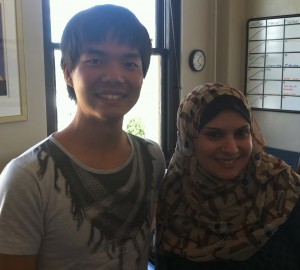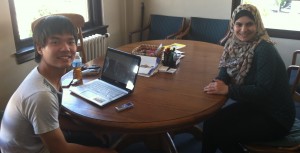 Hi! My name is Masanobu Okada, and I am a summer intern for the Rachel Corrie Foundation. I am currently studying International Studies / Peace & Conflict Resolution at Soka University of America in California, and expect to graduate next spring. I had a chance to sit and talk with Amani Inshasi, a 25-year old English-language educator from the Gaza Strip who is working to promote human rights in the area.
Hi! My name is Masanobu Okada, and I am a summer intern for the Rachel Corrie Foundation. I am currently studying International Studies / Peace & Conflict Resolution at Soka University of America in California, and expect to graduate next spring. I had a chance to sit and talk with Amani Inshasi, a 25-year old English-language educator from the Gaza Strip who is working to promote human rights in the area.
She was born in Libya and brought up in the Gaza district. After getting a Bachelor of Arts degree in teaching English, Amani started working as an English tutor for local children and young adults. She has also worked as an activist to change miserable situations that Palestinians are facing by spreading their silenced voice to the international community. I was shocked to hear the truth which most people do not know and also impressed by Amani’s continuous efforts for changing a harsh situation for the better.
The following is a series of questions and responses Amani and I shared in our interview session.
Q. What made you become an English teacher?
I studied English because if we want to address the whole world, we need to speak English which is an internationally spoken language. I really want the whole world to know what is happening in my country and to tell them the truth. In this sense, I use English as a means to express our voice which has been silenced under the Israeli occupation since 1948. This is why I tried so hard to learn and decided to become an English teacher to help children address their issues in the future.
Q. Why did you choose to work in Gaza Strip as an English teacher?
Because I have lived my whole life in Gaza, and we all know it is necessary to work on the development of the region. The Gaza Strip has been under Israeli occupation and was horribly bombed by the Israeli army in 2008 and 2012. In 2008, Israeli sea, land, and air forces bombed us for 23 days consecutively and caused killing of nearly 1,500 civilians and the injury of over 5,000 people. Also, in 2012, the Israeli bombing was literally every single minute and caused the killing and injury of many Palestinians in the Gaza Strip. Because there is no underground shelter in Gaza, we just had to hide at our own houses and keep praying that we would get out of this alive. Many people lost their houses, were dislocated, and suffered from the lingering effects of bombings. Therefore, I believe people in Gaza are the people who need education the most. This is why I decided to work in Gaza for education.
Q. How are the schools and children in the Gaza Strip?
There are two types of schools in Gaza – private and public – and the situations are very different. Compared to private schools whose teacher-student-ratio is 1-25, public schools’ ratio is 1-40 to 1-50. Based on my experience as a tutor in public schools, I can say that educational the environment needs to be improved to provide high quality education to children. I would like to note that even though there are two religions which are Christian and Muslim in the Gaza Strip, I haven’t seen any form of discrimination at schools and community. We Muslims respect Christians’ religion because every person has the right to believe in any religions and the right not to be forced by anyone. Thus, although the Gaza Strip consists of a majority of Muslims and a minority of Christians, we have never had any problem in the community.
Q. Do you think basic human rights for Palestinians are realized?
Definitely no. If our rights are realized, there would be no bombing in Gaza. If our rights are recognized, we would live with sufficient clothes, food, shelter and infrastructure. If our rights are realized, there wouldn’t be settlements for Israel which were illegally built. If our rights are recognized, our voice would be heard correctly and living conditions would change for the better. Every single day, Israel makes our lives harder and makes it harder to get Palestinians out of the region. Our human rights are not realized.
Q. How do you think English education in Gaza can impact on the Palestine-Israeli issue?
If you want to change the situation, you need to be educated to do so. Especially English is important to let your voice be heard by the international community. In this sense, I believe English education in Gaza is important and necessary to change the people’s perspectives on the issue, which will eventually stop the occupation. I know this will take time and, I am not sure when we can achieve the goal, but we will keep working until the day we accomplish it.
Q. What can people do to help solve the issue?
As I am doing, I would like people to spread the words of truth to the world. To stop illegal occupation and suffering in Palestine and to realize human rights for Palestinians, it is necessary to stop providing financial aid to the government of Israel. The biggest supporter of Israel is the U.S. government. Thus, if more U.S. citizens get to know the real situation in the Gaza Strip and demand their government to stop financing the government of Israel, this would really help stop the occupation. Therefore, please spread the truth to the people to stop human rights violations in the Gaza Strip.

The interview session with Amani reminded me of the harsh living conditions of people in Gaza and the necessity of strong support from the international community. The Rachel Corrie Foundation has supported suffering people in Gaza by enhancing awareness, promoting educational programs, and interacting with both local and international actors, for the purpose of realizing equal, universal human rights in Palestine. I hope this interview will serve as a piece of work that helps to achieve our goal of justice and peace.
 Remember Rachel!
Remember Rachel! 




